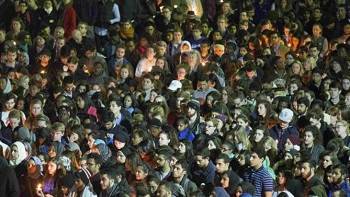Thousands of people have joined the funeral services for three young Muslim students gunned down in the US state of North Carolina, in what family members said could be "hate crime".
At least 5,000 people gathered at a mosque and nearby sports grounds in the state capital Raleigh on Thursday, to bid goodbye to the victims, Al Jazeera's Andy Gallacher, who was in the state capital, said: "There's a great show of solidarity - and not just in North Carolina."
Deah Shaddy Barakat, 23-year-old University of North Carolina dental student; his 21-year-old wife, Yusor Mohammad; and her 19-year-old sister, Razan Mohammad Abu-Salha, were killed at the university town of Chapel Hill on Tuesday allegedly by Craig Stephen Hicks.
The campus at the University of North Carolina Chapel Hill had never witnessed scenes like it as thousands of students gathered for a silent candle lit vigil.
Church bells pealed across the grounds as students stood in silence, some weeping, as a big screen displayed pictures of Deah Shaddy Barakat, his wife Yusor and her teenage sister Razan.
The images were of happier times: Deah and Yusor's recent wedding and the kind of selfies that young people across the world take. It was a somber scene but a show of unity that this small university town will not easily forget.
The 46-year old suspect has been charged with three counts of first-degree murder.
Police said a long-running dispute over parking spaces may have prompted the deadly attack.
Our correspondent, however, said that family members of the victims have questioned the official explanation.
"This was not a dispute over a parking space; this was a hate crime," Mohammad Abu-Salha, the father of the two slain women, told the News & Observer newspaper.
"The media here bombards the American citizen with Islamic, Islamic, Islamic terrorism and makes people here scared of us and hate us and want us out. So if somebody has any conflict with you, and they already hate you, you get a bullet in the head," Abu-Salha, who is a psychiatrist, said in another interview.
Suzanne Barakat, sister of Barakat, appealed to the authorities on behalf of her family, saying "we ask that the authorities investigate these senseless and heinous murders as a hate crime".
Gerod King of the Bureau of Alcohol, Tobacco, Firearms and Explosives said that agents were in touch with the US attorney's office in North Carolina that encompasses Chapel Hill and that investigators had not ruled out a hate crime.
"We understand the concerns about the possibility that this was hate-motivated, and we will exhaust every lead to determine if that is the case," Chris Blue, Chapel Hill police chief, said in an email to reporters.
The cautious wording of the police statement contrasted sharply with the anguished reaction among some American Muslims who viewed the homicides as an outgrowth of anti-Muslim opinions.
"Based on the brutal nature of this crime ... the religious attire of two of the victims, and the rising anti-Muslim rhetoric in American society, we urge state and federal law enforcement authorities to quickly address speculation of a possible bias motive in this case," Nihad Awad, of the Council on American-Islamic Relations, said in a statement.
Barakat and Mohammad were newlyweds who helped the homeless and raised funds to help Syrian refugees in Turkey this summer.
Abu-Salha was visiting them on Tuesday from Raleigh, where she was studying.
Hicks, who appeared briefly in court on Wednesday, is being held without bond. Police said Hicks turned himself in and was cooperating.
PHOTO CAPTION
Students gather during a vigil on the campus of the University of North Carolina, for Deah Shaddy Barakat, his wife Yusor Mohammad and Yusor's sister Razan Mohammad Abu-Salha who were killed in Chapel Hill, North Carolina February 11, 2015.
Al-Jazeera


 Home
Home Discover Islam
Discover Islam Quran Recitations
Quran Recitations Lectures
Lectures
 Fatwa
Fatwa Articles
Articles Fiqh
Fiqh E-Books
E-Books Boys & Girls
Boys & Girls  Women
Women










